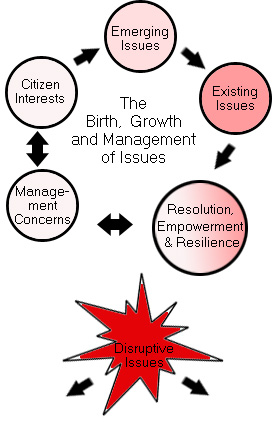
Issue Management - Resilience and Empowerment
The Discovery Process:
The means of entering a community and discerning the citizen issues.
Case Examples:
Case One
Case Two
Case Three
Case Four
Learn more about Issue Intensity...
Issue Management Handbook
A 37-page document prepared for the Washoe County Government in Nevada for its Issue Management Program in 1993. (PDF Document)
Issue Management Projects:
Holy Cross Energy, Glenwood Springs, CO
Issue Management is a method of minimizing surprise and disruption by creating a predictable, natural process of communication and action. It is a process of identifying issues in a community and organization and responding to them in a way that addresses the health and integrity of both the community and the proponent of change.
Issue Resolution Affects Project Outcome
Every project produces change that generates citizen issues which affect project outcome. Issues are subjects of widespread public interest and discussion that an individual, network or group has decided to act upon to protect and maintain control of their environment.
We have learned over the years that citizen issues have stages of development - emerging, existing, and disruptive. As issues progress through the various stages, their effects on individuals, communities, and organizations intensify.

The Life Cycle of an Issue
Emerging Issues are a curiosity phase. They are born when people become uncertain about the effect of proposed changes on their ability to protect and control their environment.
Existing Issues - If management does not "hear" the emerging issue, or if the decision is made to procrastinate, delay or ignore the response, an emerging issue will escalate into an Existing Issue. Existing Issues are a demand phase and are still resolvable through facilitation.
Disruptive Issues generate such ill will that local methods to solve them are not effective. They are handled by another level of society, usually the courts or legislatures.
As issues progress through the various stages, their effects on individuals, communities and organizations intensify.
 People Own Issues
People Own Issues
Some issues are identified through formal systems of communication such as public forums. We also tap into the informal system of communication to uncover issues at the grassroots level. In responding to these issues we create a moderate middle ground where citizen involvement becomes part of the issue-solving process. Through this process we diminish the wind in the sails of the extreme voices.
It is imperative to identify the owners of issues and maintain their identity throughout the issue management process. Only when the owners of the issues are known can the process stay grounded and the issue effectively responded to.
Themes and Issues
Issue Management distinguishes between themes and issues. Issues are actionable and grounded in resolutions. Themes are wide-spread perceptions or attitudes that are too general or abstract to act upon.
An example of a theme: "I am against growth." With further investigation, the real issue underlying the theme is uncovered: "I am against growth because the parks are over-crowded and my kids have no place to play."
If the public discourse gets captured by themes, sound bites begin to dominate and the value of action gets lost - the project will spin its wheels without traction or forward movement. Controversy is a by-product of themes and low morale and depleted energy is a by-product of controversy. The best way to create positive change in a controversial setting is to focus on emerging ISSUES and watch the themes disappear.
Resolve Emerging Issues to Avoid Disruption
Issues identified in the "emerging" stage, discovered through the informal system of communication, can be resolved at the local level with the least amount of time and resources.
Unresolved emerging issues become "existing" issues. Because these issues were not identified and resolved at the emerging, local level, they are often appropriated by formal bodies, such as environmental or industry groups, which use them to bolster support for a political, economic or ideological agenda.
"Disruptive" issues are beyond the control of local systems to resolve and are aggregated to higher levels of authority, such as legislatures or the courts.
Issue Management— Where do we go from here? |
||
| Governments | Corporations | Communities |
Cobalt Web Designs